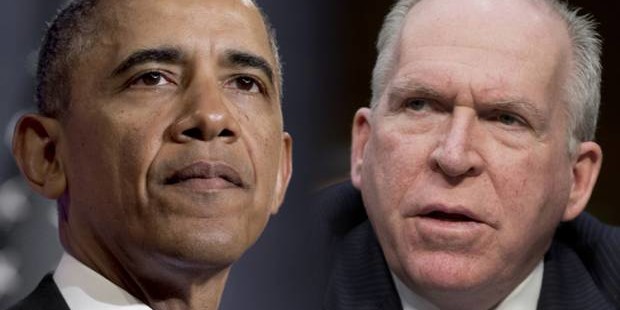
Liberal media myth officially dead: Brazen propaganda, historical amnesia and the New York Times
Does Obama have control of his own intelligence agencies? Also, the Times has an ironic definition of propaganda
This shapes up as an important week in the Ukraine crisis. We have already witnessed the extent to which the provisional government in Kiev is unable to control the country that is supposed to embrace it. This raises critical questions as Kiev mounts a military campaign to dampen dissent in the eastern regions.
On Thursday the Western powers and the provisionals will meet in Geneva with a Russian delegation headed by Foreign Minister Sergei Lavrov to discuss a political settlement. This could be the key to defusing the crisis, except that Lavrov’s adversaries have their hearts set on a nation of use in Cold War II, not a nation properly structured to accommodate its diversity and internal tensions.
You read all kinds of astonishing stuff in the press these days. Rana Foroohar made the argument in Time the other day that the West need not worry: Vladimir Putin’s petrostate is already collapsing under the weight of U.S. and European sanctions. Alas, it is so long since Time mattered one can put anything in it these days and no one notices. (I ran across Foroohar’s piece in my doctor’s office.)
On Wednesday the New York Times published a lengthy plaint about how the Russians are deploying a 24/7 propaganda machine and it is like so totally not really fair because some people actually believe this stuff — CIA Director John Brennan being in Kiev, for instance — but in the end it is OK because only Russians, it turns out, believe it. (I understand, I think.) Subtext: Please stop believing the Russians when they mention things such as Brennan’s Kiev visit. It only looks like a coup operation straight out of Allen Dulles’ playbook; it only looks as if the Russians have a more sustainable account of the Ukraine crisis.
I have been waiting weeks for a couple of core truths to emerge from the Ukraine mess, and at last they are coming good.
One is that the Western allies — and this always means the Americans with the Europeans in tow — have come up against a post–Cold War limit that has been lying out there in the middle distance since the triumphalist 1990s. The neo-liberalization of planet Earth is not a go.
Hacks always warn each other against declaring “turning points,” but this one looks likely to materialize. It is an especially fraught moment for Americans, because our understanding of destiny is the providential duty to light all dark corners. Absolutely I think this is the driving motor behind the American effort to bring neoliberalism to Ukraine. We are a nation of unconscious drives.
The provisionals in Kiev will probably do business with the International Monetary Fund and USAID. Let them, although I would not want to be Ukrainian as the multinationals arrive to rearrange the furniture. In my early estimation it will be trouble start to finish, and Ukraine will never take its place as a chess piece in the West’s very old war against the East as Russia stands for it.
Combine Ukraine with Iraq and Afghanistan, and you have the gradual foreclosing of a long list of prerogatives available to the West for centuries.
Two is a related point: The West’s monopoly on perspective is collapsing. I had better explain what I mean.
For many centuries but notably the 20th, the Western point of view enjoyed a more or less unchallenged predominance. Yes, there was an Eastern perspective, a South-side perspective. But these were confined to press services no one read and magazines that never paid. (I stand as a witness in the latter case.) A long line of diplomatic hacks preceded Samantha Power as she injects the American point of view at the U.N.
If anything distinguishes Power and her colleagues, it is good to add, it is that in them we find the phenomenon of the “Hillary hawk,” Steve Weissman’s good phrase. The post–Cold War evangelists running American foreign policy hold to the neoliberal creed, but many of them come to it via the route of liberalism. When these people start talking about humanitarian aid, call Interpol.
The monopoly on consciousness the West has long enjoyed is also drawing to a close, to put the point another way. Al Jazeera is a case in point. On a recent visit to Hong Kong, I found a lot of people taking their evening news from RT, the Russian broadcaster. This is a good sign. A multiple world lives only in multiple perspectives, even as multiplicity is deadly to the neoliberals.
This brings us back to that Times piece on Russian propaganda. I cannot tell if the correspondent, David Herszenhorn, is a crybaby all by his lonesome or if his editor put him up to it. I love this kind of paragraph to bits:

